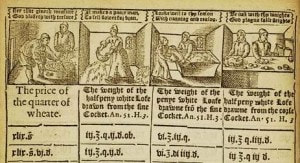|
Originally published on the Sustaining Time blog, part of an AHRC funded project which asks the question: What would be the time of a sustainable economy? This post was written by Alex Buchanan (University of Liverpool) For many people the new economics is synonymous with the rise of the artisan economy. One of the flagships for this movement is the revival of artisan bread, which includes the rise of community bakeries, such as Homebaked Anfield and the campaign for Real Bread. In order to start to tease out the relationships between time and alternative economies we’ll be including case studies of a variety of new artisan businesses. However, we’ve also been really interested in the way many approaches to the new economics explicitly draw on the past for inspiration. So we will also be exploring how archive research might shed light on contemporary questions about economics and time. We’ve been doing some preliminary research into what kinds of records might give insights into baking methods and cultures. Part of this involved finding out more about the history of the baking industry, to identify what records might have been created. This research has already thrown up some interesting findings which relate to the time-dimension and economics of baking.  Woodcut showing the making of bread in bakeries, from The Assize of Bread 1608 Woodcut showing the making of bread in bakeries, from The Assize of Bread 1608 Until 1815, bread-making was controlled by medieval legislation: the 'Assize of Bread' of 1266. This stipulated the size, weight and price of loaves according to the price of wheat and included other regulations for bread production. A number of books listing sizes and prices of loaves survive: we looked at one in the Liverpool University Special Collections as part of the 'Memories of Mr Seel's Garden' project; there's another one online here. The Assize did not prevent price fluctuation, but linked it to the grain market. Rather than competing against price as we do now, under this system, competition between bakers was based on bread quality, as it was illegal to produce cheaper loaves. This ideally led to better tasting bread, rather than simply cheaper bread. Although in times when flour was expensive, adulteration was common. During the eighteenth century, however, the monopoly of the craft guilds was breaking down and increasing numbers of bakers (often not master bakers, but journeymen acting as agents for millers and flour merchants) began to undercut the fixed price - and were hailed as the champions of liberty against the bastions of ancient privilege. After the end of the bread crisis and famine years of the late 1790s, many towns abandoned the Assize and a Parliamentary Committee appointed to enquiry into the matter in 1815 recommended that more benefits were likely to be incurred from free competition.
The actual results of deregulation, however, were revealed by H.S. Tremenheere's 1862 Report Addressed to Her Majesty's Principal Secretary of State for the Home Department, relative to the Grievances complained of by Journeymen Bakers, with Appendix of Evidence, 3027, H.C. (1862). This documented an industry still dominated by artisan methods but in appalling conditions and for low financial reward, with prices kept down by low wages and adulteration. In particular, alum was added to flour to meet public demand for 'white' bread - perceived as being purer and therefore of higher quality. Under these circumstances, author John Burnett, writing in 1963, viewed the introduction of technology and changes brought by improved scientific understanding of the baking process, as well as the importation of grain from further afield, as advances which 'rescued the journeymen from the miseries of 1862'. We’ve found a number of interesting transformations in senses of time occurring during the process of deregulation, which we will outline in our next post. Alex Buchanan Comments are closed.
|
Archives
November 2022
Categories
All
|
 RSS Feed
RSS Feed
